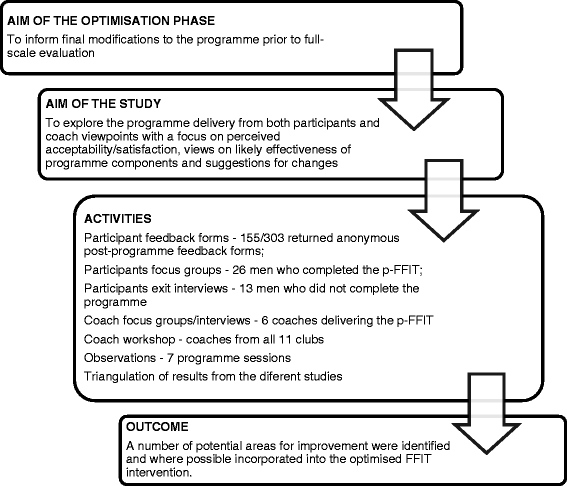Optimisation of complex health interventions prior to a randomised controlled trial: a scoping review of strategies used
- PMID: 27965837
- PMCID: PMC5153688
- DOI: 10.1186/s40814-016-0058-y
Optimisation of complex health interventions prior to a randomised controlled trial: a scoping review of strategies used
Abstract
Background: Many complex intervention trials fail to show an intervention effect. Although this may be due to genuine ineffectiveness, it may also be the result of sub-optimal intervention design, implementation failure or a combination of these. Given current financial constraints and the pressure to reduce waste and increase value in health services research, pre-trial strategies are needed to reduce the likelihood of design or implementation failure and to maximise the intervention's potential for effectiveness. In this scoping review, we aimed to identify and synthesise the available evidence relating to the strategies and methods used to 'optimise' complex interventions at the pre-trial stage.
Methods: We searched MEDLINE, CINAHL, AMED, PsycINFO and ProQuest Nursing & Allied Health Source for papers published between January 2000 and March 2015. We included intervention development and optimisation studies that explored potential intervention weaknesses and limitations before moving to a definitive randomised controlled trial (RCT). Two reviewers independently applied selection criteria and systematically extracted information relating to the following: study characteristics; intervention under development; framework used to guide the development process; areas of focus of the optimisation process, methods used and outcomes of the optimisation process. Data were tabulated and summarised in a narrative format.
Results: We screened 3968 titles and 231 abstracts for eligibility. Eighty-nine full-text papers were retrieved; 27 studies met our selection criteria. Optimisation strategies were used for a range of reasons: to explore the feasibility and acceptability of the intervention to patients and healthcare professionals; to estimate the effectiveness and cost-effectiveness of different combinations of intervention components; and to identify potential barriers to implementation. Methods varied widely across studies, from interviews and focus groups to economic modelling and probability analysis.
Conclusions: The review identifies a range of optimisation strategies currently used. Although a preliminary classification of these strategies can be proposed, a series of questions remain as to which methods to use for different interventions and how to determine when the intervention is ready or 'optimised enough' to be tested in a RCT. Future research should explore potential answers to the questions raised, to guide researchers in the development and evaluation of more effective interventions.
Keywords: Acceptability; Complex interventions; Effectiveness; Intervention development; Modelling; Optimisation; Pre-trial; Scoping review.
Figures




References
-
- Byford S, Sefton T. Economic evaluation of complex health and social care interventions. Natl Inst Econ Rev [Internet] 2003;186(1):98–108. doi: 10.1177/00279501031861010. - DOI
-
- Wells M, Williams B, Treweek S, Coyle J, Taylor J. Intervention description is not enough: evidence from an in-depth multiple case study on the untold role and impact of context in randomised controlled trials of seven complex interventions. Trials [Internet] Trials. 2012;13(1):95. doi: 10.1186/1745-6215-13-95. - DOI - PMC - PubMed
Publication types
LinkOut - more resources
Full Text Sources
Other Literature Sources
Miscellaneous

